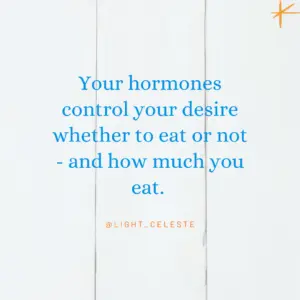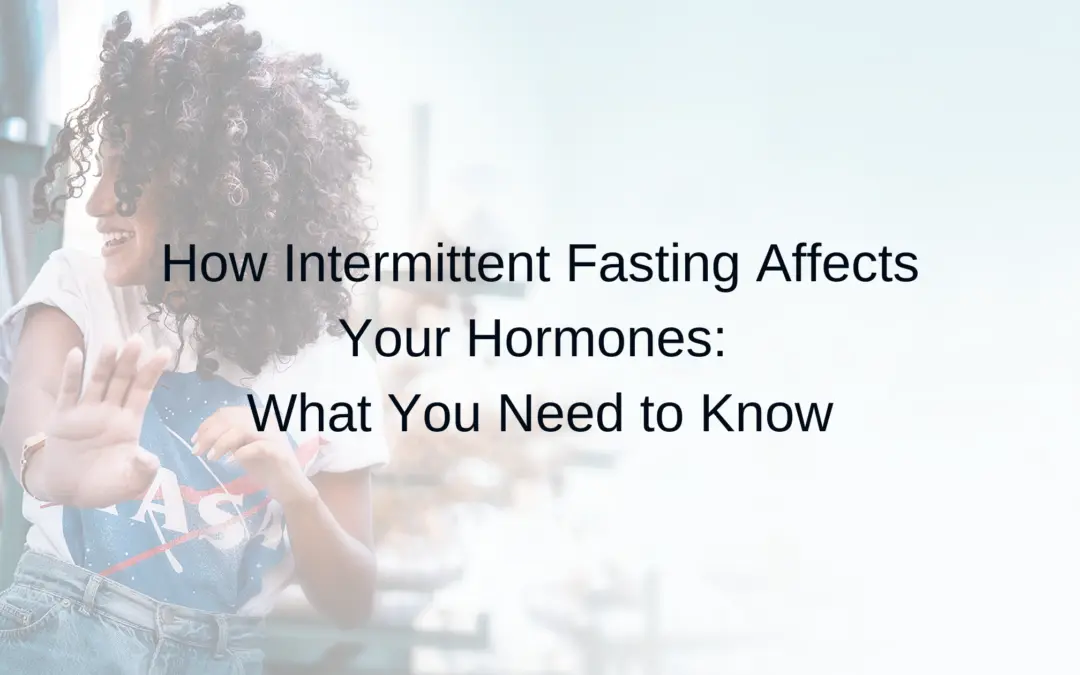There’s a big debate going on out there. Maybe you’ve heard about it. That’s right, we’re talking about intermittent fasting. Many women wonder if intermittent fasting is safe for them. And, they wonder if intermittent fasting balances hormones.
These are both good questions. Unfortunately, there’s a lot of false and misleading information that goes along with that big debate. It’s time to set the record straight.
Some say the studies show that women should not practice intermittent fasting – that it’s unsafe and wrecks their hormones.
Some say intermittent fasting is perfectly safe for most women. There are of course some exceptions to this, which we talked about in Intermittent Fasting for Women: 5 Things You Need to Know. Women have been fasting for thousands of years, just like men. One study done on the effects of Ramadan fasting on female hormones found no detrimental effects in the hormones before and after the fast.
The bottom line is, intermittent fasting does have an effect on women’s hormones and that’s what we’re here to talk about today – how intermittent fasting can help balance your hormones.
So let’s dive in!
Intermittent Fasting and Female Hormones
We have two main female sex hormones: estrogen and progesterone. Let’s take a look at how these two hormones affect functions within your body.
Estrogen
Estrogen is the hormone responsible for the physical changes during puberty that turn a girl into a woman. Estrogen helps control the menstrual cycle and is important for childbearing.
During your monthly cycle, estrogen peaks at about days twelve through fourteen. You can help boost your body’s natural uptick in estrogen by fasting for a shorter period of time on those days.
To make estrogen, you need healthy levels of insulin and glucose. When you practice intermittent fasting, it’s important to be aware of this peak in estrogen and the accompanying needs your body has for more insulin and glucose.
On the days when your estrogen is rising, give your body more carbohydrates. Beans, citrus fruits, squashes, potatoes, and rice are all good choices. This will help your body produce the estrogen it needs.
Progesterone
Progesterone prepares your body for a potential pregnancy after ovulation. Progesterone spikes after ovulation. If an egg is not fertilized, progesterone decreases.
Progesterone peaks at day twenty-one of your cycle. This is another time where it’s best to have shorter fasts. If you’re fasting too much, your body won’t make enough progesterone.
Fasting thirteen to sixteen hours is more than enough. Save the longer fasts for later. Once again, at that time you’ll need a higher carb diet for your body to make adequate progesterone. Plan on incorporating more good quality complex carbohydrates into your diet during these days.
How Intermittent Fasting Balances Female Hormones
Extreme calorie restriction, extreme exercise, and nutritional deficiencies can cause irregular or skipped periods. During your eating window, it’s important to eat until satiated. Intermittent fasting is not about calorie restriction.
Calorie restriction is a stressor that puts undue stress on the body. This can modify the release of sex hormones. If you’re thinking about becoming pregnant, you shouldn’t fast longer than 24 hours at a time.
Estrogen and progesterone decline during menopause. If you do too much fasting during the wrong time of the month you can send those hormones into an even more depleted state.
The bottom line is, you’ll want to pay close attention to your hormones throughout your cycle. Adjust your intermittent fasting schedule to accommodate the needs of your changing hormones.
If you’re unsure about how to practice intermittent fasting to help balance your hormones, an intermittent fasting coach can help. Choose an intermittent fasting coach who has experience working with women of all ages.
Intermittent Fasting Balances Your Hunger Hormones
You thought it was all about willpower, but the truth is your hormones control your desire whether to eat or not – and how much you eat. They tell you when you’re hungry and when you’re full. They control how much of the different macronutrients you eat. You have two main hunger hormones – ghrelin and leptin, but insulin also plays a role.

Insulin hormone
Insulin is often referred to as the “master hormone.” It’s also a fat-storing hormone. After you eat, insulin takes glucose from your bloodstream into your cells and tissues to use for energy. It’s a hormone that is essential for life.
When you’re healthy, the right amount of insulin is produced when needed and your body is balanced. But your body can become insulin resistant and insulin loses its effect. We talk a lot about insulin resistance and how to fix it in this article – Insulin Resistance Explained: Helpful Tips on How to Quickly Reverse Insulin Resistance for Optimal Health –
Ghrelin
Ghrelin is the hormone you can thank for those hunger pains. It’s the hormone responsible for stimulating appetite and getting your body ready for food. Ghrelin is produced in the stomach and small intestine. It stimulates appetite and starts digestion and fat storage.
Interestingly, when people were given artificial ghrelin, the amount of food they ate increased by 30%. Since ghrelin affects appetite, it can also affect your weight loss efforts. When you restrict and control calories, your body increases ghrelin production, making you even more hungry. Hence the dreaded diet rebound that happens every time you stop dieting.
Ghrelin actually decreases during intermittent fasting and at the same time, your dopamine levels increase. This allows you to transition from burning sugar to burning fat and helps reduce your cravings.
See, it never was about self-control, it was your hormones making you eat! It’s hard to use willpower to overcome a physiological process that’s in place to keep you alive.
Leptin
If ghrelin is the “green light” that tells you to eat. Leptin is the “red light” that tells you when you’ve had enough. Leptin, also called the satiety hormone, is designed to help you maintain your weight. Leptin is found in your fat cells, so the amount of leptin in your body is directly related to the amount of fat you have.
When your body is functioning properly and your hormones are balanced, your body will determine how much leptin to release based on your energy needs. Leptin will send a signal to your brain to lower your appetite. This allows your body to dip into fat stores when more energy is needed. Basically, leptin tells your brain how much energy you need to burn each day.
Learning to listen to your hunger cues is important if you want to get a handle on your food intake. Intermittent fasting can help you re-learn how to feel those hunger and satiety cues. It can help you learn to eat until you’re satisfied, but not overfull.
Intermittent Fasting and Stress Hormones
Stress. It seems so overwhelming these days! Sometimes it can feel like you’re barely keeping your head above water. You know too much stress isn’t good for you, but what does it really do to your body? You may already know about cortisol, but what about adrenaline? Let’s take a look.
Cortisol
Cortisol is famously known as the “stress hormone.” You’ve probably heard time and time again to watch your stress levels so you don’t end up with high cortisol. Cortisol is mainly known for its role in managing stress. But cortisol regulates a range of processes in your body, including metabolism and the immune response. Cortisol is responsible for these functions:
- Controlling blood sugar levels
- Regulating metabolism
- Reducing inflammation
- Assisting with memory
- Controls the balance of salt and water
- Controls blood pressure
- In women, cortisol supports the developing fetus during pregnancy
Cortisol really is a crucial hormone to help protect your overall health. But too much cortisol can be detrimental. High cortisol levels can affect your menstrual cycle and reduce your libido.
When you practice intermittent fasting, you place stress on your body, but it’s positive stress, called hormetic stress. The opposite is distress, which can send your body into a full-blown stress response.
Mild dietary stress is beneficial for overall health and longevity. So while cortisol levels may go up a little during intermittent fasting, they will balance back out once you start eating.
Adrenaline
Have you ever had an experience where your heart starts racing and your hands begin to sweat and you start feeling like you need to get out of your situation immediately? If you have, you’ve experienced the fight-or-flight response brought on by adrenaline.
Adrenaline is the “fight-or-flight” hormone. It allows you to stay and fight or run to safety when you perceive a life threat. Chronic stress can cause you to have persistently high levels of adrenaline. When this happens, you’re more likely to experience anxiety, depression, and weight gain.
Sometimes, when we’re under a lot of stress, our body will release adrenaline even though we’re not in any real danger. Adrenaline also releases glucose, but if there isn’t any real danger to escape from, you don’t have a way to use that extra energy from the glucose.
Reducing stress is key to reducing elevated levels of stress hormones in your body. It’s important to listen to your body and give it rest and fuel when needed. Intermittent fasting is meant to help your body heal. And sometimes, to do that, you need to eat. When you work with an intermittent fasting coach, they’ll help you know when to fast and when to hold off for a bit.
Does Intermittent Fasting Help Balance Hormones?
In a word, yes.
Intermittent fasting, when done carefully and correctly, helps balance hormones. And the opposite is true. When done too much or for too long, it can be detrimental to your health and set you back.
Many people have the mindset that if something is good, more must be better. But that’s simply not the case here. Intermittent fasting is not an “all or nothing” protocol. It’s not about how many hours you can fast. It’s about how you listen to your body and give it what it needs.
I love helping women just like you find health and food freedom with intermittent fasting. I’m an intermittent fasting coach. I work closely with you to tailor a program to meet your goals. When you work with me, you get one-on-one customized support. Are you ready for better health?!
Let’s start creating a healthier, happier you!
Sign up for a free 20-minute consultation using the link below.
Sources:
- What is Estrogen?
- Is Intermittent Fasting Safe For Women? All Your Questions Answered
- You And Your Hormones: Cortisol
- Endocrine and chronobiological effects of fasting in women
- Effects of long-term fasting on female hormone levels: Ramadan model
- Your Menstrual Cycle on Intermittent Fasting
- Is intermittent fasting a good idea when suffering from stress?
A Quick Disclaimer: All posts on this blog are for informational purposes only. They are not intended as medical advice. Please consult your healthcare provider for a personal assessment before beginning any nutrition or exercise program.




